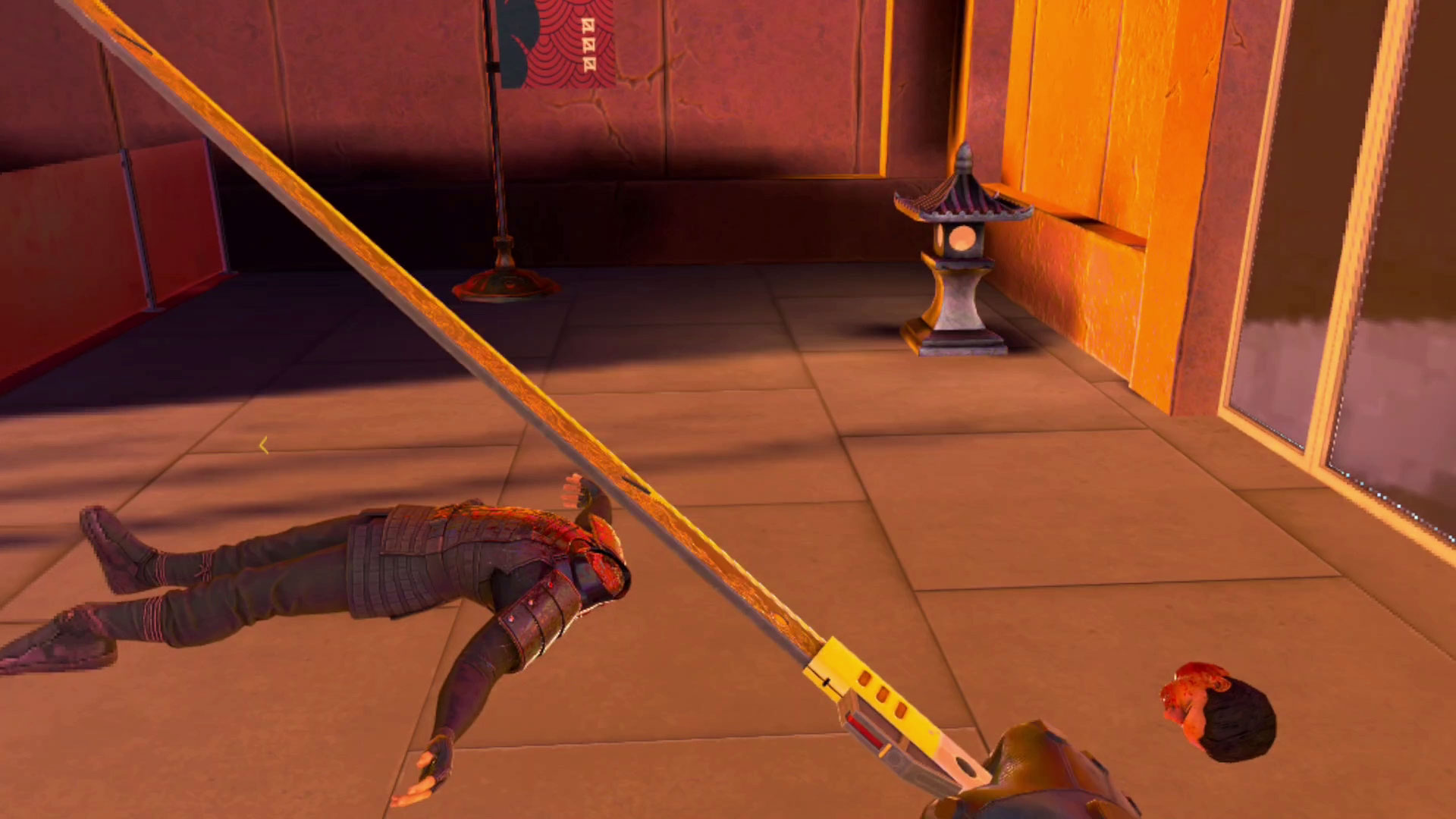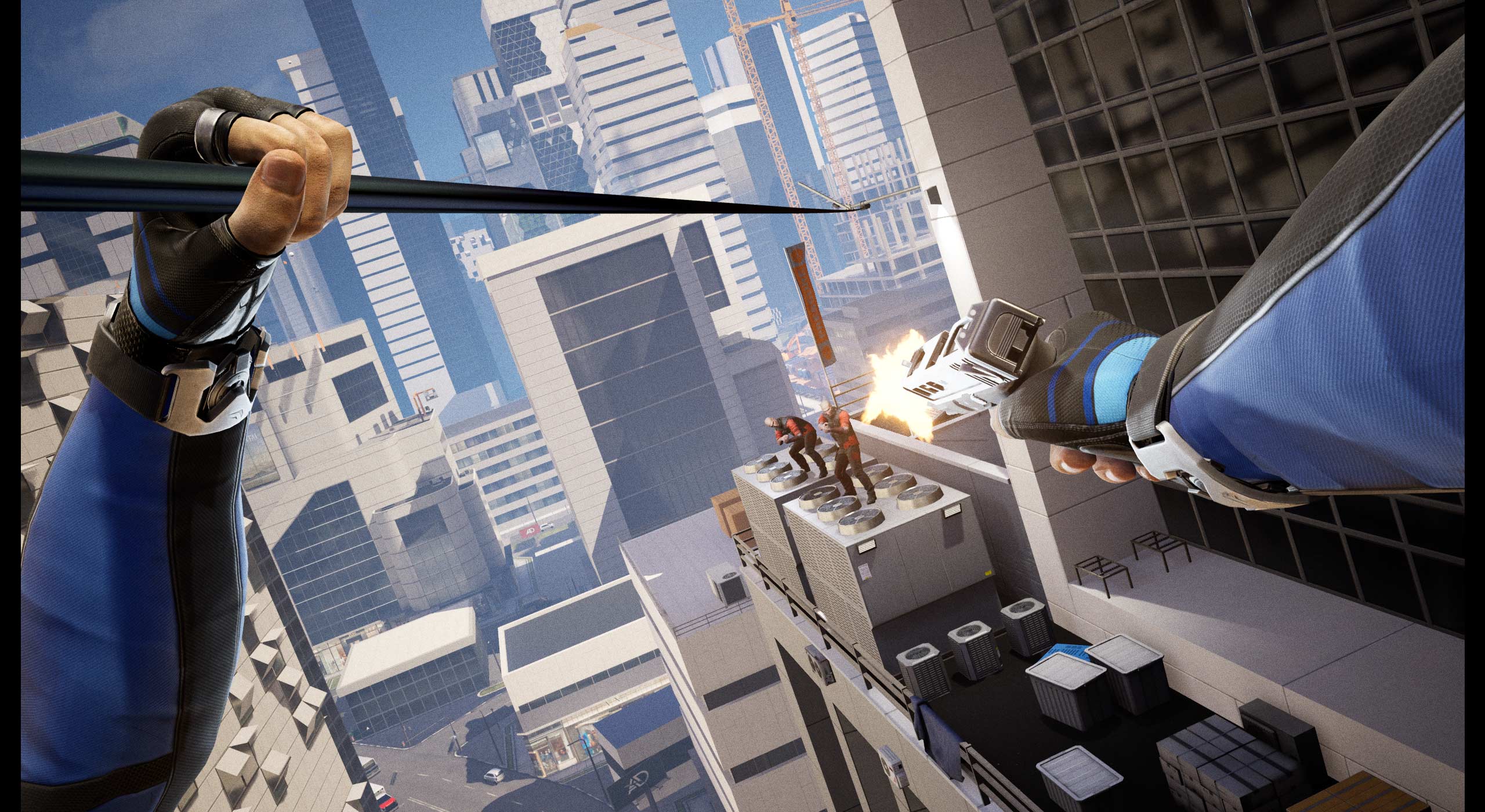STRIDE (2021) offers up the sort of parkour action you’d expect from a VR-native version of Mirror’s Edge (2008), replete with jumping across dangerous urban chasms, wall-running, and shooting your way past a bunch of roof-walking goons. While previously slated to arrive as DLC to the original game, developer Joy Way has now released the campaign as a standalone title, bringing the same high-flying flair as the original along with a pretty serviceable story to go along with it. Read more to find out whether it was worth the wait.
STRIDE: Fates Details:
Available On: Quest, SteamVR
Release Date: November 9th, 2023
Price: $30
Developer: Joy Way
Reviewed on: Quest 3
Gameplay
You’re a Chaser—a sort of futuristic spec-ops soldier who was plucked out of the slums of Airon City to serve in the SkyChasers police force. Using your augmented superhuman abilities to fight a number of gangs, you traverse the world killing literally everyone in your way for whatever reason the game can put in front of you next.
You’ll use a pistol, SMG, shotgun, knife, and even a futuristic katana at times to put the baddies down in the most stylish way you can think of. Here I am blasting into the air from an air-vault, activating slow-mo, hooking a drone suspended in the air, and swinging around like Spider-Man—fairly par for the course for Stride.
Because it offers up physics-based interactions in the vein of Blade & Sorcery (2018), both games put the onus on the player to consciously elect to make cool kills, replete with slow-mo bullet time so you can gank multiple dudes John Wick-style.
Here’s where Fates differs, as you’ll be thrust into fights in one-off environments that can be as straight-forward or as cinematic as you can handle. When it all comes together, it’s basically one of the most satisfying combat experiences you can have in VR.
If you liked the high-flying, free-running action of the original, Fates handily serves up more than six hours of well-thought-out, objective-based levels that offer plenty of opportunity to flex your shooting, jumping, and running skills—the latter of which is done by physically pumping your arms to move you faster than the snail’s pace that a full throttle left joystick provides. You can also turn on the same mode from Stride Arcade, which allows you to jump by thrusting your arms instead of hitting ‘A’.
To be frank, the game’s AI is very basic, with bad guys acting more like the sort of ragdoll beat-em-up dummies—another reason why I mentioned Blade & Sorcery. Enemies are more like slightly dangerous moving targets than adversaries as such, and they’re all basically the same. Even on the highest difficulty, it’s more about how you finesse your way from point A to point B than fighting against truly challenging enemies. There are a few boss-level enemies with special abilities, but I would have liked a little more variety throughout.
While you’ll definitely need to shoot your way out of situations, there is some light puzzling too. Puzzles feel like they were partially informed by Half-Life: Alyx (2020), offering up a few basic styles which unlock doors, including a sort of carnival-style game that tasks you with leading a ball across an obstacle-laden pipe. They’re all fairly simple, but it’s nice to see they’re not only in use to service your path forwards in the game, but also to unlock secret areas that may have the game’s only real collectibles: multi-colored packs that you can later spend at the end of the mission to unlock weapon upgrades.
Gathering these packs is really what drives you to loot a whole level, presenting you with three types of packs ranging from common to rare. Weapon upgrades are fairly sparse, although mostly functional and straight forward, such as an extended mag, a red dot sight, or higher caliber. I was hoping for more here since it’s such a big part of the game, although it’s basically serviceable.

While many puzzles are almost like AR mini-games splayed out in front of the locked door or loot box, one of my favorite puzzles is when you’re prompted to connect to Cyber Space, which is a sort of obstacle course that feels like it would be at home in old films like Hackers (1995), TRON (1982) or Lawnmower Man (1992). It’s a great “safe” place to polish your skills, almost as if it’s reminding you that you shouldn’t always go the safest route when you’re back in the overworld.
It took me a few hours to really gel with Stride: Fates, as the first hour is where you’ll not only learn all of the new skills you’ll need, but also buck up against the sort of jank that seems baked in.
Climbing feels like a mental exercise every single time, leaving me to wish it were more like The Climb 2 (2021) in solidity. Grabbiing onto a ledge is hit or miss, as you need to hit it just right. Overshoot a storm drain and you’ll grasp fruitlessly at the air as you fall to your death, annoyingly putting you back to your last checkpoint.
Another medium-sized gripe is gunplay, which always feels a little fussier than it ought to. Reloading is abstracted to force grabbing ammo you find on the ground and then putting your gun by your hip to automatically reload. The developers say they’re currently working on manual reloading, which will come as a post-launch update. The guns also feel like they’re tilted a bit higher than they should be, which makes aiming and getting a good sight picture a little more annoying than it ought to be.
Immersion
As a campaign-focused game, it would seem like Fates needs to have a really solid story to complement its fun and engaging action. That said, the game’s story isn’t going to win any awards for originality or execution, but it does provide solid scaffolding to support a mostly enjoyable parkouring experience. At times, it’s painfully blind to its own kitschiness, which might have otherwise been dispelled with a fourthwall-breaking nod to the player. Voice acting also doesn’t feel well-directed, which is a shame because it further cheapens the already trope-laden narrative. It all basically fits in the “so bad it’s good” category.
Level design is overall very good, offering plenty of different platforming challenges. What few stealth levels there are feel less impressive, as they’re basically useless since there’s no real penalty to alerting a guard to your presence. Some levels even disable your guns, but whatever the case, you can always punch a guy to death, knife someone straight through the skull, or even slice dudes in half with a sword, which is fun but basically so overpowered that you can abandon all illusion that you’re going to ninja your way around a level when you can just chop everyone to pieces.

There’s also a great variety of set pieces of both indoor and outdoor environments to tackle which keeps things interesting across the game’s 12 levels.
Sound design is also fairly good, giving you a heads up when enemies are engaging you, when they individually die, and when all enemies are dead in a given area. This keeps the UI less cluttered, as you engage enemies mostly in a natural way instead of looking for floating HP bars, etc.
Comfort
Like its older sibling, Stride: Fates is surprisingly comfortable for a game that has you basically bouncing off the walls and blasting through large, multi-plane environments. Still, if you’re at all sensitive to artificial movement, you may need to take breaks periodically. I found only a few instances when comfort was an issue, and it was either due to having to repel up a rope (blarg) or encountering a bug where you wall-slide inadvertently.
‘STRIDE: Fates’ Comfort Settings – November 9th, 2023 |
|
Turning |
|
| Artificial turning | ✔ |
| Snap-turn | ✔ |
| Quick-turn | ✖ |
| Smooth-turn | ✔ |
Movement |
|
| Artificial movement | ✔ |
| Teleport-move | ✖ |
| Dash-move | ✖ |
| Smooth-move | ✔ |
| Blinders | ✔ |
| Head-based | ✔ |
| Controller-based | ✖ |
| Swappable movement hand | ✖ |
Posture |
|
| Standing mode | ✔ |
| Seated mode | ✔ |
| Artificial crouch | ✔ |
| Real crouch | ✔ |
Accessibility |
|
| Subtitles | ✔ |
| Languages | English |
| Dialogue audio | ✔ |
| Languages | English |
| Adjustable difficulty | ✔ |
| Two hands required | ✔ |
| Real crouch required | ✖ |
| Hearing required | ✖ |
| Adjustable player height | ✖ |
,
